The Huckster Ads of Early “Popular Mechanics”
Weird, revealing, and incredibly fun to read
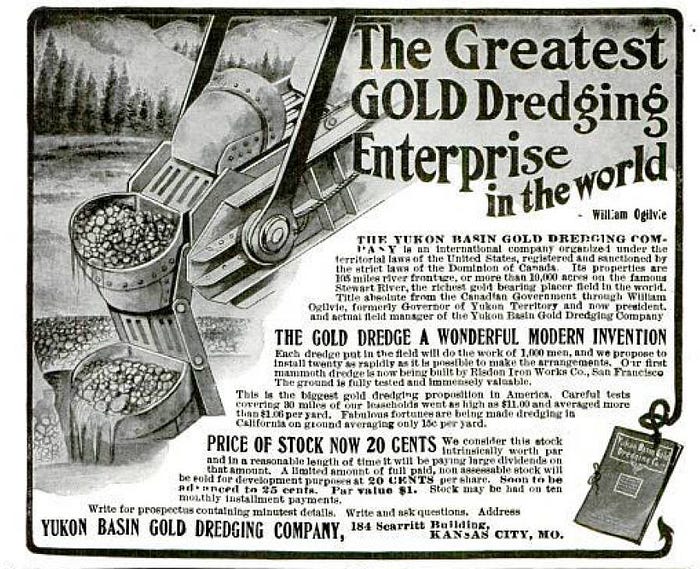
When I’m bored and worried about falling into a Twitter hole, there’s one thing that can always divert my attention.
Going over to the Internet Archive and perusing the incredibly weird ads of early-20th-century Popular Mechanics.
What, you haven’t already discovered this yourself?
You’re in for a treat. Popular Mechanics was a curious beast back in those days. Like the name suggests, it included tons of stories about inventors around the world, and stuff they were getting up to. So in the April 1920 issue, for example, you had articles like these …

A ceiling lamp that lets you yank a fixture downwards to be reading lamp (legit good idea: I’d buy something like that from Ikea today); an “odd baby carriage” that seems indescribably unsafe; and a device for playing solitaire upright in bed, which is actually kind of cool.
There was also plenty of news about the frontiers of science, including — again from that same issue, this piece …
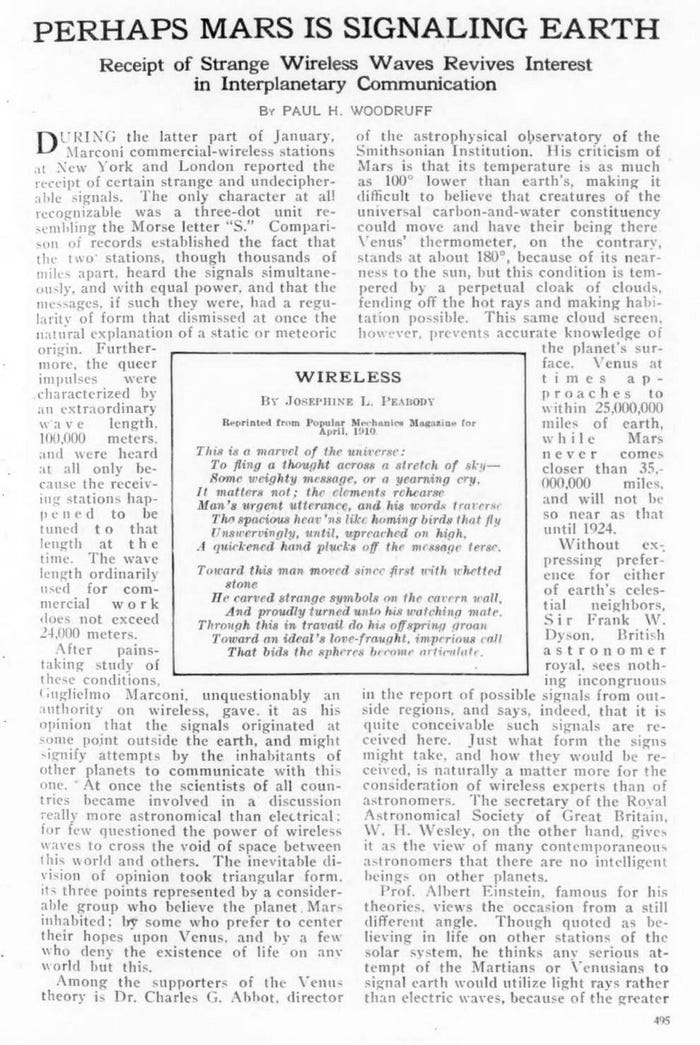
… a full-on investigation of whether radio inventor Guglielmo Marconi has discovered that Mars has been sending Morse-style signals to Earth, complete with thoughts from Thomas Edison on the viability of constructing a mammoth array of lights to send a signal back.
So the content was, in some respects, much like the techy-engineering stuff you’d see today in Popular Mechanics, Popular Science, Wired or the myriad of online science/engineering sites. A little heavy on the credulous paranormal at times, as with this 1923 piece on spirit photography (“Remarkable Demonstration in Broad Daylight before the Editors of This Magazine”)
But the truly delightful stuff wasn’t in the actual articles, interesting as they may be.
No, the mesmerizing stuff is the ads.
By and large, they are an absolute carnival of hucksterism. Enforcement of truth in advertising was still pretty skimpy back then; the FDA was only established in 1906 after journalistic outcries against the hawking of bogus health remedies in periodicals.
The categories of puffery are quite interesting, though, because they betray the anxieties and dreams of Popular Mechanics readers. One of the big tropes was …
MEN! Climb the manly corporate ladder with correspondence courses

Easily half the ads in these issues are for correspondence courses. It was clearly a big thing back then, maybe loosely comparable to the boom in MOOCs and coding bootcamps a few years ago.
In each case, the pitch is the same: You’re a schlub, doing an unskilled job, waiting in line with the other losers for a day’s work. But there’s a world where you could have high-demand skills! Just write for this easy correspondence course and the pay is yours!
They had it for every conceivable field …

The auto and electrical industries were huge and growing, so that makes sense. I am less sure if there was a booming need for taxidermy, but maybe there was? I am too lazy to research this.
There’s a ton of gender mania going on here. These ads all address “MEN!”, hammering home the abject shame of not being a manly provider. Indeed, if you think a lot of American men today are having a total nervous breakdown about not having enough man-itude — witness Alex Jones shilling up to $800,000 a day selling “Super Male Vitality” drops and crap like that — consider this ad …

Quite on top of this gibbering anxiety over masculinity, the class-shame going on in these ads is radioactive indeed. The ads continually hammer home the message that if you’re not climbing the ladder with a helpful and affordable correspondence course, you are a complete zero. This ad from 1908 says it all …
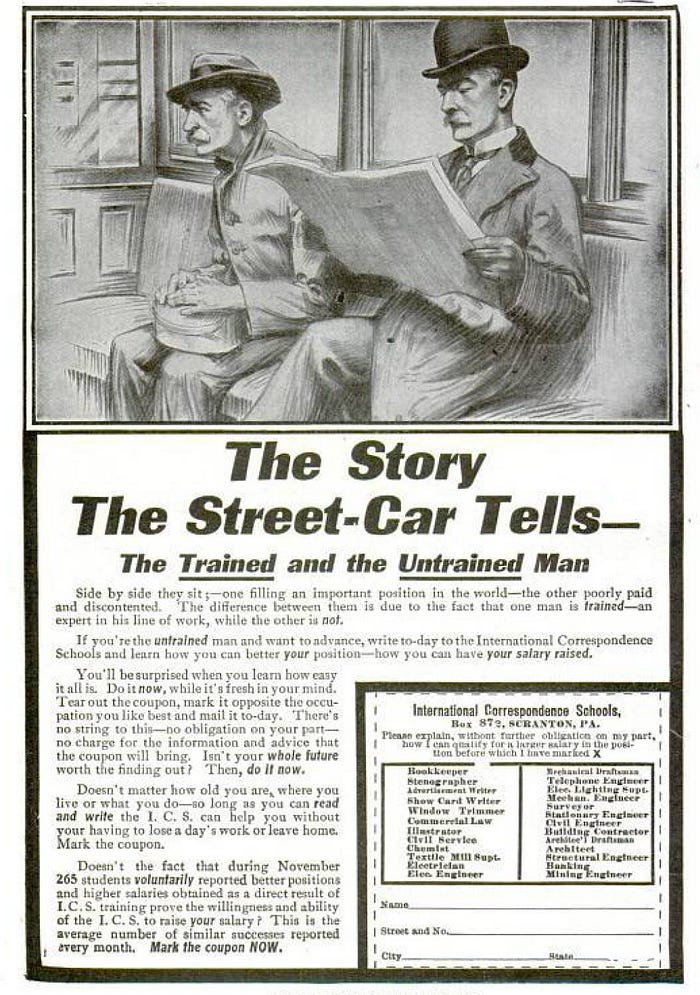
“Side by side they sit; — one filling an important position in the world — the other poorly paid and discontented.”
I wonder how much money these scammy courses made off these ads? A fair amount, I’m guessing. They certainly spent enough on their ads to keep Popular Mechanics afloat for decades.
On top of the He-man job fetish, there were ads that even more straightforwardly mocked guys for not being guy enough …
“How Do You Look in a Bathing Suit?”

When I was a kid in the 1970s, I saw all those ads in comic books for the Charles Atlas bodybuilding system — “The Insult That Made A Man Out of ‘Mac’”, in which a slender gentleman is threatened by a bigger oaf at a beach, humiliated in front of his girlfriend, and he uses Atlas’ system to bulk up and then kick the crap out of the oaf, to the delight of the ladies. I had figured this ad was old, but not that old; like from the 60s?
Nope! Wrong! Atlas was running ads like that in the 30s, and as you can see from this 1923 ad, the industry of negging dudes for having unmanly bodies goes way back.
The copy on that ad above is hilariously straightforward. “A fine protector you would make, when you can’t even fight your own battles. What are you going to do? She is going to find you out.”
She is going to find you out.
Or consider this one …

I have to say, I’m half-charmed by the literary quality of the bodyshaming here. Dude has read his Ivanhoe! And assumes the nebbishy reader of Popular Mechanics has too!
This ad also contains the age-old contention — which wouldn’t be out of place in a rambling, seven-hour YouTube jeremiad by Jordan Peterson today — that the modern world is making us too soft. (“Our indulgence in worldly pleasures has made us a race of anaemic, flat-chested dyspeptics.” Dyspeptics!!) Extra points for the blind-item, faux-sociological quotes from a random woman, too: “The men I meet today are so weak-kneed they can barely stand up straight.”
Various sundry remedies
But enough about jobs and dudes.
Snake-oil salesmen were out in full force in the ad-pages of early Popular Mechanics. There were a lot of claims for “electrical” cures …

… though a big subset of the electrical-cure genre was the vibrator, which — unlike those other forms of faux-science above— actually had a genuine use …
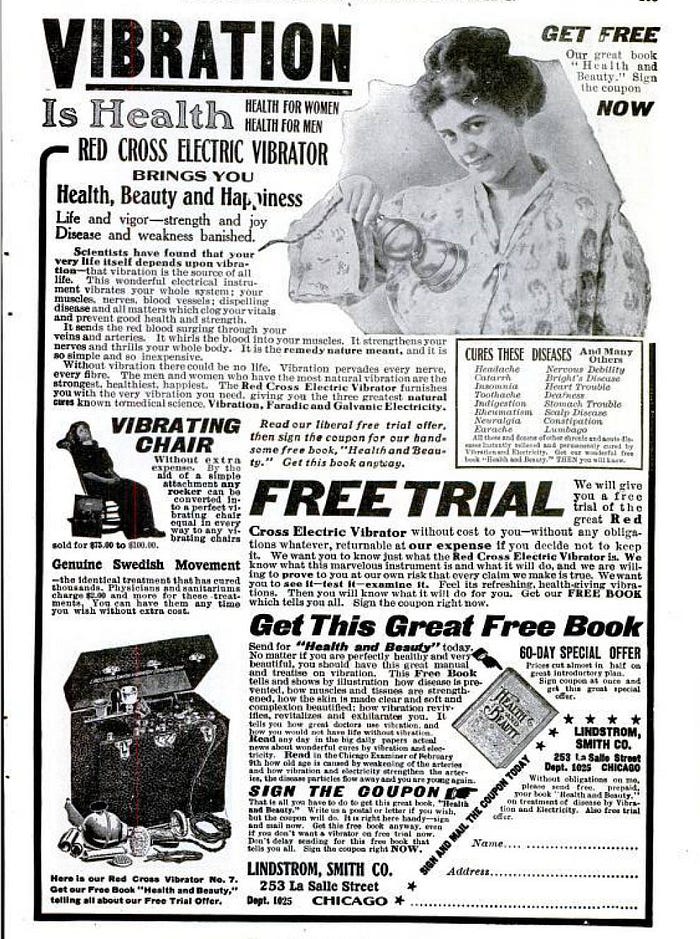
The sheer breadth of quack remedies was pretty impressive. Whatever you wanted to fix, there was someone offering a gizmo or book of instructions on how to tackle it — poor eyesight, bad memory, generalized pain …
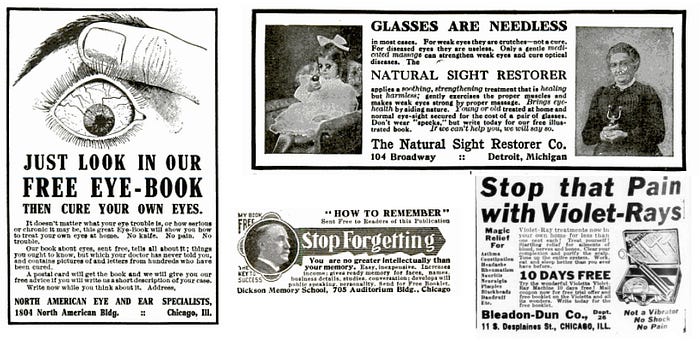
Get passive income — from patents!
The passive-income dream is very old indeed, it appears.
Most issues of older Popular Mechanics devoted several full pages of ads to offering patent-registration schemes, lawyers, and agencies. Live by the fruit of your mind! “Your ideas may bring you a fortune if properly introduced.”
Here’s a few from just one single issue in 1908 …
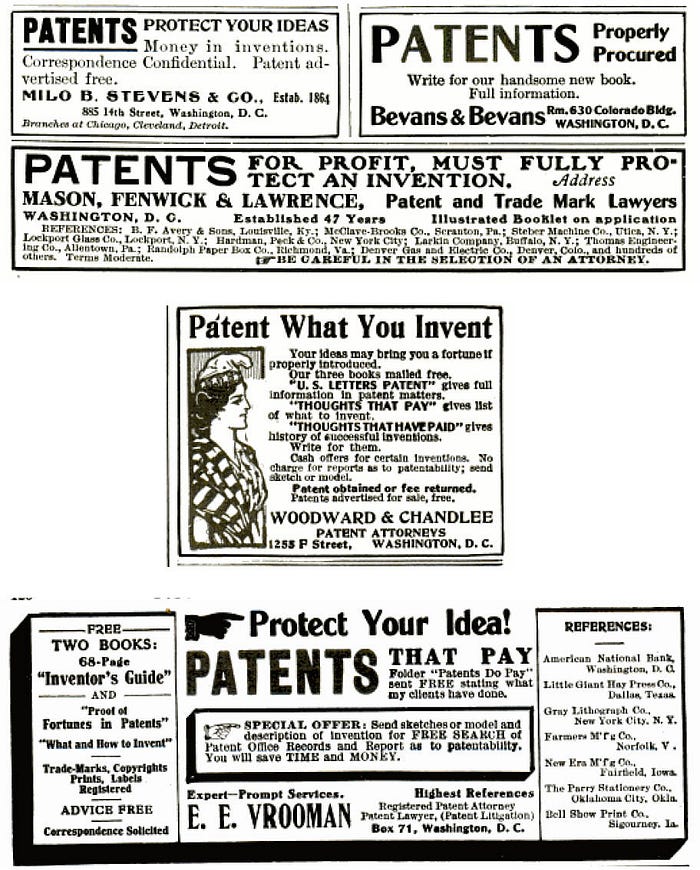
Gizmos, gizmos, gizmos
And perhaps unsurprisingly, there were a lot of tech gadgets being hawked back then …

I dig the “Adjusto-Lite” brand name, and that ad copy cracks up me up: Read, write, study, work, and — crucially — shave anywhere.
That ad for converting a bike into a motorcycle is pretty rad, and reminds me of the kits one sees today for converting a bike to an ebike. And lastly, that ad for the radium flashlight is bittersweet: Radium really did seem like a magical substance — incredibly bright for months or years in the dark, so they put radium on watch faces and anything else that had to illuminate. Alas, it took them several years to figure out it was radioactively poisoning the people who used these products, to say nothing of the folks who assembled them.
You could also turn a Luger pistol into a rifle …

… and make “BIG MONEY in Poultry” …

Okay, I’ll stop now. But seriously, if you’re ever bored — or just looking to “rewild your attention”, as I’ve written about in the past — go to Archive.org and pick an old magazine from back then (like Popular Science or Popular Mechanics), or just type “magazine” and a year like 1897, and start poking around in those old publications. They’re fascinating.
(If you dug this little historical odyssey, hie thee to the “clap” button — which can be clapped upon up to 50 times per reader!)



0 Comments